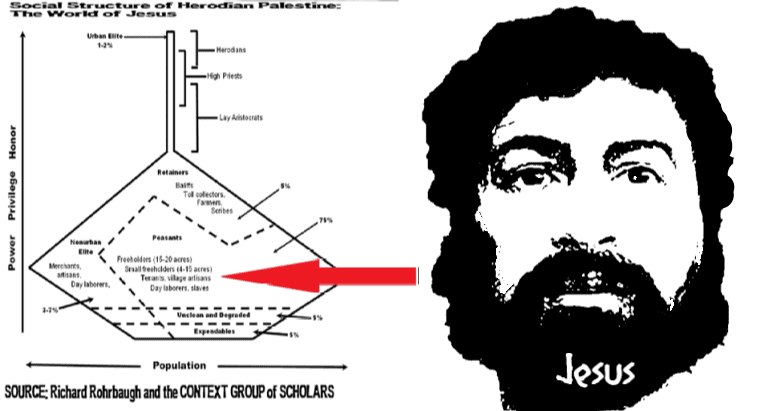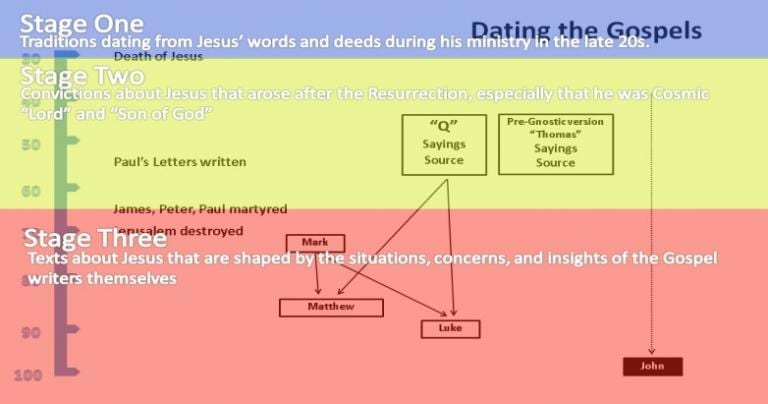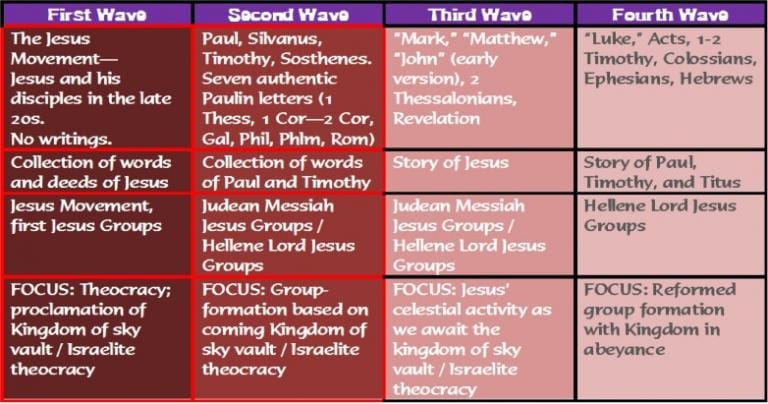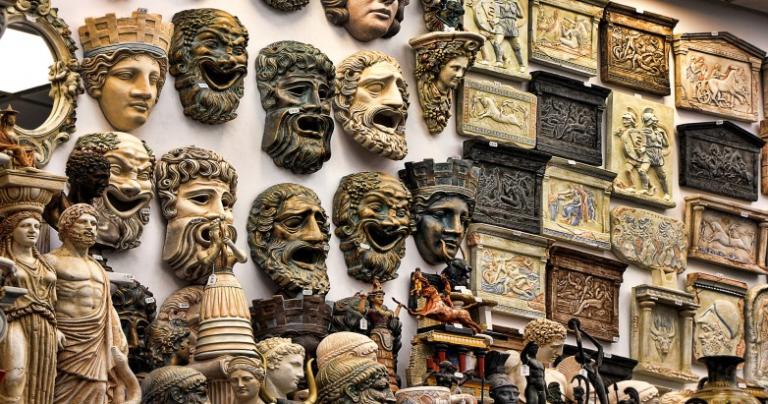
The “Woes” we read in “Matthew” show us that Jesus wasn’t a nice person.
Do you imagine that Jesus was nice and polite? In the Gospel we call “Matthew,” Jesus relentlessly insults the scribes and Pharisees, fakers he mocks as mask-wearing actors and the bastard offspring of snakes. Does that sound like a nice, polite person? The Care Bear Jesus of devotional sentiment needs to go if you want to come to know the real Jesus. The “woes” featured in the lectionary readings from Monday, Tuesday, and Wednesday of this week help us wake up in this regard.
The Middle Eastern world from which our Bible comes is agonistic—prone to conflict—and insults are essential to social interaction there. This is on display in the document we call “Matthew,” Gospel of Beatitudes and Woes.
It may shock nice American Christians to learn that Jesus was far from being a nice person. We 21st century Westerners who claim to love “meek and humble of heart” Jesus (Matthew 11:29) tend to be completely blind to so many essentials concerning the social world of the Middle East.
Jesus: Insulting and Inconsistent
For at least four thousand years Middle Eastern people expect insults to flow freely like their next breath. This is an ever-present key reality and like any living garden must be watered and pruned regularly. Middle Eastern people are up to that task. Middle Eastern culture determines, nourishes, accepts, and promotes this aspect of the agonistic personality found there.
As scholars Bruce Malina and John Pilch have shown convincingly, that world of the Bible also expects inconsistency, so much so that people there are well adapted to comfortably living with it. Inconsistency in the Middle East is normative (see Malina, Bruce, 1986, ‘Normative dissonance and Christian origins,’ Semeia 35, pp. 35–59).
As Dr. John Pilch one Lent said to a Church full of nice (and mortified) cradle Catholics, “Consistency gets you to Jonestown, Guyana. Inconsistency gets you a decent life.” Interesting vistas about how we understand holiness and healing might open up if we let in this messy idea of Dr. Pilch.
Jesus, at Home in His Culture
Jesus was no exception to these culturally-specific ways. All canonical Gospels record “the Gentle One” violently exploding in the Temple (Mark 11:15-19; Matthew 21:12-13; Luke 19:45-48 and John 2:13-17). Jesus in “Matthew” commands calling no one fool, for if you do, “you will be liable to the Gehenna of fire!”—but only chapters later, in perfect Middle Eastern form, he derides the Pharisees as “blind fools!” He is proficient at scathing name-calling, such as his favorite hypokritai (literally “actors,”Matthew 6:2), gennēmata echidnōn (“snake bastards,” Matthew 23:33), ethnikos (“non-Israelite,” Matthew 18:17), and his lowest, kynariois (in context, “bitches,” Mark 7:27).
The MENA personality Jesus is depicted in the Gospels as sometimes being unsympathetic toward or disinterested in others and their plight (see Matthew 15:21-24). Choosing favorites among his closest associates, he typically excludes most of the Twelve from some activities (Mark 9:2–8; Matthew 17:1–8; Luke 9:28–36). Jesus was secretive, obscure in language (Mark 4:10–12).
Even a cursory reading of the Gospels shows that Jesus was far from being “nice” and “polite,” especially in the mainstream American use of these terms. A series of statements attacking his enemies paints quite a picture and shakes up sentimental nonsense obfuscating the authentic Jesus.
Shaming Opponents with Woes
To understand these statements, called “woes” in Biblical parlance, we need to say something about Biblical cultural values. Social values—social guides for human behavior passed on generationally by which all aspects of life are shaped and controlled—belong to every culture. Therefore we must carefully read the Matthean Woes in terms of the cultural values of honor and shame which drive the circum-Mediterranean world.
How important is understanding this? Of all basic things Western Christians need to learn concerning the Bible, honor and shame come first. Not understanding this necessarily leads to distorting the Bible.
Honor means the public claim, whether by person or group, to value and the society’s acknowledgement of that claim.
Shame in the negative sense or dishonor means failure or refusal to acknowledge the public claim. It correlates with honor.
Negative shame happens when an otherwise honorable person or group becomes dishonored or fails to safeguard and maintain honor. Protecting honor is a deadly serious business throughout the Mediterranean, but most especially, in the Middle East. The relevance of the “woes” can be found here.
Is All Shame Negative? and Guilt-Culture
But we should note that in the world of the Bible, shame can also be seen positively. Positive shame is the sense and concern honorable Mediterranean folks have for their honor-rating, their reputation. On the other hand, those who are labeled “shameless” or they who “have no shame!” must be deemed dishonorable people according to this cultural consensus reality.
The consensus reality of our 21st century Western society is oriented differently—here, in our cultural world, the drive is psychological guilt. This is radically different than the first century Mediterranean world of Jesus. Every iota of public life in that biblical world is permeated with and driven by honor. Understand that and you will soon realize why Jesus, Middle Eastern Master of the Insult, in all three stages of Gospel development was a walking dead man in his society.
A Deadly Game of Push and Shove
As said above, three times this week at liturgy Latin Catholics read from Matthew 23 and the “Woes.” Readers are presented with a long stream of nasty insults and very public challenges with which the Matthean Jesus strikes the “scribes and Pharisees.” These woes are way beyond the scope of ordinary honor-challenges of push-and-shove contests that regularly occur in Middle Eastern villages. Jesus’ insulting words are way over the line. These woes invite death.
In an earlier post, we spoke about the three stages of Gospel formation. Did the Jesus of history really behave like how “Matthew” depicts him? Was this reflective of how Jesus actually was, Stage One of Gospel formation? Yes, undoubtedly the historical Jesus was a master of insults. He regularly insulted folks in high places, and this helped get him killed. But in the 20s of the first century, his historical opponents were not so much Galilean Pharisees as they were the Urban Elites and their retainers, Sadducees and scribes.

But by Stage Three of Gospel Formation, with the Temple destroyed and the Sadducees all dead, new enemies had emerged for the Matthean Jesus Group. Their opponents likely were Pharisees related to Yohanan ben Zakkai. Hence, “Matthew” makes his Jesus mouthpiece for his community’s present conflict (Stage Three of Gospel Development).

The Bible is not a Gallery of Photographs
With that in mind please do not read the Gospel depictions of the Pharisees as if they are photo-accurate depictions perfect in correspondence with the real. Inspired though they may be, biblical writings often present one end of a telephone conversation. Inspiration and inerrancy (however one may understand that) may relate, but the inerrancy of Scripture is salvific and not cognitive. Scripture is not a flawless map indicating precisely a “who’s who” of the evil “SOB’s” of salvation history.
We should also understand that the leaders of the Matthean Jesus group saw themselves as the righteous counterparts of “the Pharisees and scribes” they condemn. Again, this is one end of a telephone conversation. As with other “biblical baddies” such as Judas Iscariot, Jezebel, Ananias and Sapphira, the Johannine Secessionists, and the Nicolaitans, Scripture doesn’t provide us with a Ben Zakkaists’ surrejoinder!
Also please do not confuse “the Pharisees and scribes” condemned here by the Matthean Jesus with later Jews! The (probably Ben Zakkaist) Pharisees presented here in a one-sided manner are the root of a branch of one Israelite tradition that would evolve into “rabbinism” in the early third century. Centuries later, one branch of this tradition would evolve and emerge as the Judaism we know today: the Jewish religion. We must make distinctions. Not doing so in this case furthers the horrific blight on Christianity that is antisemitism.
Before the Woes, Beatitudes
To better appreciate the “Woes” of “Matthew,” it is a good idea to examine his Beatitudes. The Old and New Testaments are peppered with over eighty “beatitudes.” These poetic expressions praise, encourage, and celebrate honorable behavior. Since the meaning of words is derived from social systems, it is culturally inappropriate that the first word of each beatitude be rendered in English as “happy,” “fortunate,” or “blessed.” Rather, the correct translation is “truly honorable is…” or “highly esteemed is …”
With that understood, here is a culturally plausible rendering of the Matthean Beatitudes, Matthew 5:3-11—
“Truly honorable is the one who [cannot maintain and] has lost his honor-status
for theirs is the kingdom of sky vault [politically correct expression of Israelite theocracy, which restores without surpassing their original status]
“Truly honorable is the one who [engages in social protest by] mourn[ing],
for they will be comforted [ = theocracy will restore their lost kinship network members].
“Truly honorable are the meek [ = those who CAN resort to violence to take back their status, but are confident in the God of Israel and therefore choose instead gentle non-violence],
for they will inherit the land [of ancient Israel, and with it, their original honor-status, no more, no less].
“Truly honorable is the one who hungers and thirsts for righteousness [= who fasts, engaging in social protest],
for they will be satisfied [in theocracy].
“Truly honorable are the merciful [those who fulfill filial obligations to others, who give what is owed],
for they will be shown mercy [the fulfilment of obligations, the giving of that which is owed].
“Truly honorable are the pure of heart [single-hearted/single-minded person who seeks only to honor God],
for they will see God [in theocracy].
“Truly honorable are the mediators [those who head-off blood feuds],
for they will be called children of God [ = clients of the Patron, the God of Israel = genuine Israelites = honored].
“Truly honorable are they who are persecuted [those hazed/publicly humiliated to conform to other Israelite ingroup norms] for the sake of righteousness [proclaiming theocracy],
for theirs is the kingdom of sky vault [Israelite theocracy].
“Truly honorable are you when they insult [shame] you and persecute [haze to conform someone back into their ingroup norms] you and utter every kind of evil against you [falsely] because of me. Rejoice and be glad, for your reward will be great in sky vault [publicly seen, and everyone will see]. Thus they persecuted the prophets who were before you.”
Matthew’s Made-Up Sermon
Living decades after the Jesus Movement, “Matthew” has spliced together a collection of fragments of Jesus’ teachings, constructing an artificial sermon taking place on a hill (Matthew 5—7). “Luke” creates something very similar, but in truncated form and given by Jesus on a plain (Luke 6:17-49). Beatitudes begin both theologically crafted sermons. Note that “Luke” renders them in the second person singular (“Honorable are you who…”) whereas “Matthew” employs the third person singular (“Truly honorable is the one who…”).

At some point somewhere, probably in the Galilee around 29 CE, Jesus likely gave a sermon with three basic beatitudes praising the honorable behavior of being poor, mourning, and hungering! The author we call “Luke” preserves these original three. But “Matthew” has creatively expanded them into eight beatitudes. At all stages of the tradition Jesus, and the different theological portraits the evangelists make of him, turns the world and its values upside down. That which the God of Israel truly esteems and honors is opposite to what men in any culture treasure.
Jesus’ Insulting Woes of Shame
With all this taken into account, let’s consider the Matthean “Woes.” If a “beatitude” is a statement of praise given for honorable behavior then the “woes” are insulting comments given for shameful activity. The eight beatitudes of Matthew 5 parallel the woes listed in Matthew 23.
To start things off and set up the “woes,” Matthew 23:2-10 lists a slew of damning accusations for those SOB Pharisees [read the Ben Zakkaists]. Like the mask-wearing actors throughout the Mediterranean world, these evildoers are good at “putting on a show.” They preach well enough about the good, but don’t practice it, and they narrowly interpret and apply the law to suit their performance, and they hog the spotlight.

Reading the Woes with Understanding
The “woes” begin in Matthew 23:13. Whereas with the first beatitude, the Matthean Jesus opens up theocracy for those in the Matthean Jesus group (“the poor in spirit”), the Pharisaic scribes reject theocracy and close it off to themselves and others. This earns them the first of a list of dishonoring woes.
Matthew 25:13-36
“Most dishonored are you, scribes and Pharisees, you actors! You lock the kingdom of sky vault before [Israelite] human beings. You do not enter yourselves, nor do you allow entrance to those trying to enter.
“Most dishonored are you, scribes and Pharisees, you actors! You traverse sea and land to make one convert, and when that happens you make him a child of Gehenna twice as much as yourselves.
“Most dishonored are you, blind guides, who say, ‘If one swears by the temple, it means nothing, but if one swears by the gold of the temple, one is obligated.’ Blind fools!—which is greater, the gold, or the temple that made the gold sacred? And you say, ‘If one swears by the altar, it means nothing, but if one swears by the gift on the altar, one is obligated.’ You blind ones!—which is greater, the gift, or the altar that makes the gift sacred? One who swears by the altar swears by it and all that is upon it; one who swears by the temple swears by it and by him who dwells in it; one who swears by sky vault swears by the throne of God and by him who is seated on it.
“Most dishonored are you, scribes and Pharisees, you actors! You pay tithes of mint and dill and cummin, and have neglected the weightier things of the law: judgment and mercy and fidelity. [But] these you should have done, without neglecting the others. Blind guides, who strain out the gnat and swallow the camel!
“Most dishonored are you, scribes and Pharisees, you actors! You cleanse the outside of cup and dish, but inside they are full of plunder and self-indulgence. Blind Pharisee, cleanse first the inside of the cup, so that the outside also may be clean.
“Most dishonored are you, scribes and Pharisees, you actors! You are like whitewashed tombs, which appear beautiful on the outside, but inside are full of dead men’s bones and every kind of filth. Even so, on the outside you appear righteous, but inside you are filled with mask-wearing and evildoing.
“Most dishonored are you, scribes and Pharisees, you actors! You build the tombs of the prophets and adorn the memorials of the righteous, and you say, ‘If we had lived in the days of our fathers, we would not have joined them in shedding the prophets’ blood.’ Thus you bear witness against yourselves that you are the children of those who murdered the prophets; now fill up what your fathers measured out!
“You serpents! You snake bastards! How can you flee from the judgment of Gehenna? Therefore, LOOK!—I send to you prophets and wise men and scribes; some of them you will kill and crucify, some of them you will scourge in your synagogues and pursue from town to town, so that there may come upon you all the righteous blood shed upon earth, from the righteous blood of Abel to the blood of Zechariah, the son of Barachiah, whom you murdered between the sanctuary and the altar. Amen, I say to you, all these things will come upon this generation.”
American Christian Directions
Where do 21st century Western Christians fit into all of this? We don’t; at least not directly. Americans and other Westerners are simply not driven by honor and shame as were Jesus and our biblical ancestors in the Faith.
But like all humans at all times, we do have our own cultural values. Americans can easily see their own disclosed in our trinity of sports and especially when disaster strikes. We spend so much energy on unsustainably accumulating material goods, voracious consumption, and signifying personal achievement. Crises and calamities jar and shake our complacency. Once the hurricane, deadly fire, flash flood, or earthquake has come and gone, United States survivors always testify how much more valuable is life than our many acquired idols. But given enough time, Western survivors go right back to our cultural addictions.
How important it is to see that the Lord Jesus was a peasant, Galilean day laborer.
Turn our world upside down, Middle Eastern Jesus, before we kill this world. Amen.












